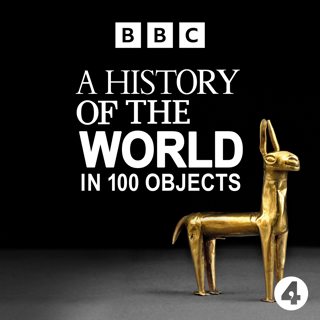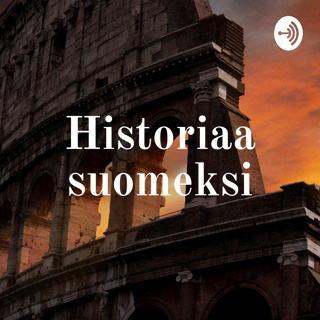
Olmec Stone Mask
Neil MacGregor, in his history of mankind as told through objects at the British Museum, selects a miniature mask to tell the story of the Olmec - the mysterious people of ancient Mexico who lived before the time of the Aztecs or Maya. As the Parthenon was being created in Greece and the Persians were expanding the world's biggest empire, what was life like for the "mother culture" of Central America? Neil explores the life of the Olmec and visits the remains of one of their greatest legacies. He considers their remarkable skills in mask making with the Olmec specialist Karl Taube and the Mexican novelist Carlos Fuentes.
25 Helmi 201013min

Basse Yutz Flagons
Neil MacGregor's history of the world recounted through objects at the British Museum arrives in Northern Europe two and a half thousand years ago. Neil explores the early world of the Celts through two bronze drinking flagons, considered to be the most important and earliest examples of Celtic art. The writer Jonathan Meades and one of the world's leading experts on this period, Barry Cunliffe, help describe the Celts, dissect the stereotypes and consider their celebrated love of drink.
24 Helmi 201014min

Parthenon Sculpture: Centaur + Lapith
Neil MacGregor's telling of the story of humanity through individual objects at the British Museum. This week he is looking at the emergence of powerful new forces across the globe around the 5th Century BC, from Confucius in China to Cyrus in Persia. Today he looks at the emotionally charged sculptures that were made for the Parthenon in Athens. Carved out of marble around 440BC these beautiful figures continue to generate huge controversy around the world for the fact that they remain in London and have not been returned to Greece. In today's programme the British Museum's director acknowledges the political controversy of the Elgin Marbles (named after the British Lord who carried them off) but concentrates on their artistic story and on exploring the ancient Greek world that created them. He describes a culture besotted with the myths and imagery of battle. The Greek archaeologist Olga Palagia and the classicist Mary Beard help conjure up the extraordinary city of antiquity.
23 Helmi 201014min

Oxus Chariot Model
Neil MacGregor's world history told through objects at the British Museum arrives in Persia 2500 years ago. Throughout this week, Neil is looking at powerful leaders across the ancient world. Today he focuses on Cyrus, the first Persian emperor who created the largest empire the world had ever known. It stretched from Turkey to Pakistan and required a hugely sophisticated network of communications and control. At the heart of today's programme is a gold chariot pulled by four gold horses. This hand-sized model helps explain the rule of Cyrus, the "king of kings", and his ambitions for his vast territory - with contributions from the historian Tom Holland and Michael Axworthy of the University of Exeter. How does this glorious pre-Islamic past sit with the people of Iran today?
22 Helmi 201014min

Gold Coin of Croesus
The history of the world as told through one hundred objects from the British Museum. This week Neil MacGregor, the Museum's Director, has been looking at the collapse of old regimes and the emergence of new powers from the Middle East to China. In today's programme, he describes how a powerful new state finds a dramatic way to help run its increasingly complex economy and trading networks - using coins. Croesus was a king in what is now Western Turkey and his kingdom was called Lydia. It's remarkable that over two thousand years later we still have an expression that celebrates his wealth. Neil MacGregor considers how money, in the form of coins, first came about and describes the (hugely complex) methods of creating them. And whatever happened to Croesus?
19 Helmi 201013min

Paracas Textile Fragment
A history of the world described through individual objects at the British Museum. This week Neil MacGregor, the Museum's Director, is looking at what was happening around the world between 2000-3000 years ago. The theme so far has been one of empires collapsing, new regimes and warfare. In South America there were no new empires and we still don't entirely understand the cultures that were thriving there. In this programme, Neil MacGregor shows off some of the remarkably preserved textiles discovered in the Paracas peninsula on the southern coast of Peru and tries to piece together what life might have been like for these people living in around 500 BC. The early Peruvians went to astonishing lengths to make and decorate their textiles whose colours remain striking to this day. What were they for and what do they tell us about beliefs of this time?
18 Helmi 201014min

Chinese Zhou Ritual Vessel
Neil MacGregor's history of humanity told through one hundred objects from the British Museum. Three thousand years ago, the world was in huge flux, with new powers creating sophisticated new societies - from the Middle East to South America - as older ones collapsed. In today's programme, Neil MacGregor finds out what was happening in China of that period and describes how a group of outsiders, the Zhou, overthrew the long established Shang dynasty. The story is told through a bronze bowl that was used for feasting. What does this beautiful bronze bowl tell us about the Zhou and life in China at this time? Dame Jessica Rawson and the Chinese scholar Wang Tao help paint the picture
17 Helmi 201013min

Sphinx of Taharqo
Throughout this week, Neil MacGregor is describing power struggles across the globe around 3000 years ago, as ambitious new forces set about building sophisticated new societies - from the Middle East to South America. Today he describes what was happening along the River Nile and how a powerful new king conquered Egypt from Sudan. His name was Taharqo and he ruled from a vibrant new civilisation (in modern day Sudan) called Kush. These days few people even know that the mighty land of the Pharaohs was once ruled over by its southern neighbour. The evidence is summed up by a sculpture at the British Museum that shows the ruler from Kush as an Egyptian sphinx.
16 Helmi 201013min





















